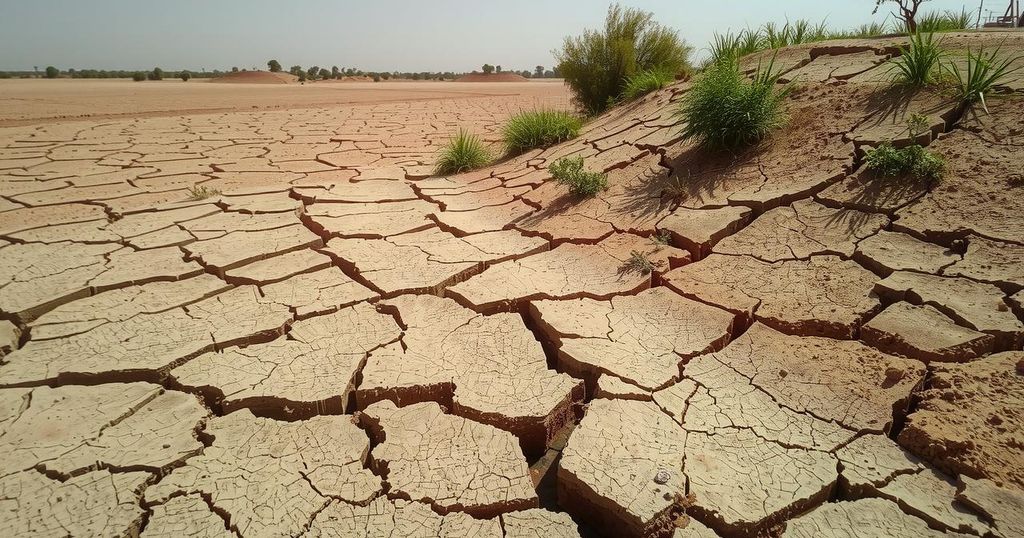The Heinrich Boell Foundation report highlights a drastic loss of arable land in Kenya, with only 20 percent remaining usable. Soil erosion and salinization are major threats, leading to declining food production. The report advocates for agroecology as a sustainable solution to restore soil health and enhance food security, while experts call for dietary diversity and organic practices to address nutrition needs.
Recent findings from a report by the Heinrich Boell Foundation have raised alarms about the significant loss of arable land in Kenya, indicating a potential food crisis in the coming years. The report reveals that only 20 percent of Kenya’s land is arable, with the situation expected to deteriorate further. Annually, the country loses approximately 26 tonnes of soil per hectare due to erosion, and 4 percent of irrigated land is affected by salinization, both of which threaten food production sustainability.
Heinrich Boell Foundation’s Director, Joachim Paul, emphasized the critical role of soil health in sustaining ecosystems and food security, particularly in Africa. He made these remarks during the launch of the Soil Atlas-Kenya Edition in Nairobi, which examines soil quality for food production viability. The findings indicate that soil degradation is undermining food productivity efforts, particularly in rural areas, exacerbating social inequalities.
Excessive reliance on synthetic fertilizers, monoculture farming, and deforestation are significant contributors to declining soil fertility and increased desertification. The report highlights that 63 percent of Kenyan land suffers from acidity, 80 percent exhibits phosphorus deficiency, and 75 percent experiences diminished organic carbon levels, adversely affecting soil fertility and microbial activity.
To combat these challenges, the report advocates for sustainable farming methods such as agroecology to rehabilitate soil fertility. Dr. Harun Warui, Lead Programme Coordinator at the Heinrich Boell Foundation, recommended agroecology as a holistic approach to agricultural practice. He noted that agroecological practices could enhance yields by approximately 30 percent while lessening reliance on expensive synthetic fertilizers, thereby bolstering resilience against climate change.
Christine Gatwiri, a Project Coordinator at Route to Food Initiative (RTFI), underscored dietary diversity as a long-term solution for nutrition security. She called for a shift towards organic inputs and sustainable soil practices that improve the nutritional value of food. Gatwiri pointed out that healthy soils produce nutrient-dense crops, ultimately benefiting human health while addressing nutrient-deficient soils.
RTFI previously urged the government to adopt agroecological practices to resolve persistent food challenges in Kenya. During a workshop, Dr. Martin Oulu expressed concerns about biodiversity loss due to harmful agricultural inputs. He argued for the promotion of agroecology and other nature-based agricultural solutions to tackle food insecurity effectively. Oulu posited, “Why should we import fertilizer when we can train farmers to produce organic fertilizer in their backyards?”
Furthermore, the University of Nairobi’s Dr. Oulu stressed the need for agricultural institutions to adapt their curricula to include agroecology courses, thereby facilitating knowledge transfer and biodiversity conservation. Agroecology encompasses diverse agricultural practices, including crop diversification, conservation tillage, natural fertilizers, and rainwater harvesting. These methods aim to increase productivity while enhancing environmental sustainability.
In conclusion, the alarming loss of arable land in Kenya poses significant risks to food security, necessitating immediate attention to soil health and sustainable farming practices. The Heinrich Boell Foundation’s report underscores the urgency of adopting agroecology as a viable solution to enhance soil fertility and resilience against climate change. By prioritizing dietary diversity and organic inputs, Kenya can work towards restoring its agricultural landscape and ensuring long-term nutritional security for its population.
Original Source: www.kenyanews.go.ke






